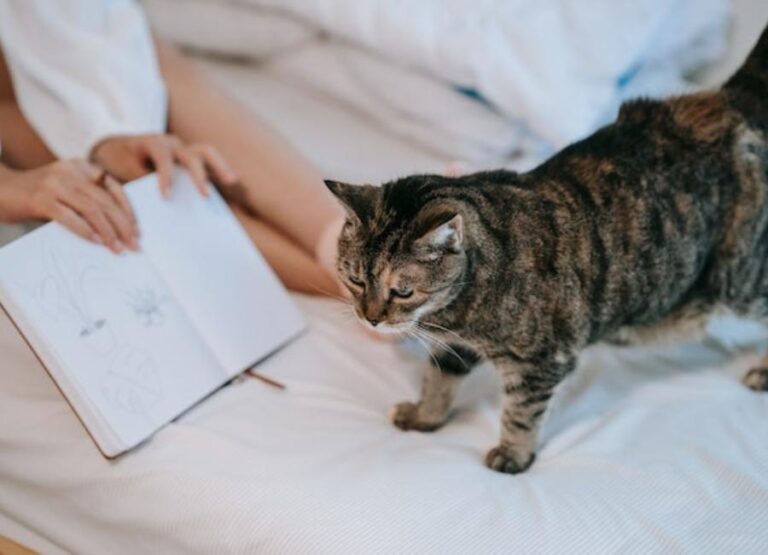Do Cats Need To Go Outside [Pros & Cons]
![Do Cats Need To Go Outside [Pros & Cons] Do Cats Need To Go Outside](https://petcreeks.com/wp-content/uploads/2021/08/Do-Cats-Need-To-Go-Outside.jpg)
Cat owners always ask do cats need to go outside and as a cat owner with years of experience, I will outline the pros and cons of letting your cat go outside with my verdict.
It’s not just a matter of preference, but also a matter of safety. Outdoor cats are at risk for exposure to all sorts of dangers – like cars, rats, and other predators.
Cats are natural hunters and outdoor cats may get into more trouble with hunting than they would if they were indoor-only cats.
If your cat is outside for ten hours every day, he or she may end up in a fight with another animal or get into fights over food scraps from your garbage can.
Do Cats Need To Go Outside
Yes, it is true! However, leaving your cat to go outside unsupervised is not a good idea, since they are still vulnerable to outside threats such as vehicles, other animals, parasites, and sickness.
If you do allow your cats to go outside, keep them on a leash or harness and take precautions to protect them from these dangers.
Contrary to popular belief, cats do not need to go outside without their owner’s supervision.
However, there are some who believe that cats should go outside because they were originally wild animals.
This is not true! Cats also do need to drink from water bowls or eat from plates because they have a desire to build these habits.
These are just some myths about cats that you may have heard of before! Keep reading for more information on whether your cat needs outdoor time or not.
Why cats need to go outside under the owners supervision
Cats are more likely to develop diabetes, heart disease, and arthritis when they don’t get enough exercise.
Cats who stay inside all the time are also more likely to gain weight and have litter box issues.
With that said, cats can’t go outside in most situations. So what should you do? Is your cat an indoor-only cat? Do they seem sad or bored?
It may be time to make some adjustments to your home life and find a way for them to get the exercise they need.
Here are reasons why your cat needs to go outside under your supervision:
Allowing your cat to go outside might help increase the cat’s self-esteem
Most cats are timid and shun humans and other pets; allowing your cat outside might help increase his or her confidence.
Your cat’s confidence will definitely be boosted by meeting new friends, whether they be dogs, cats, or humans.
The more time your cat spends outside, the more at ease he will be among other animals.
People believe that most cats are violent toward other cats or dogs, but this is because they are timid and lack confidence when meeting new pets.
Taking your cat for a stroll outside is a kind of exercise
In nature, cats are highly active, lively, and energetic, and they require a lot of activity to be healthy and happy.
As previously said, allowing your cat to go outside is a fantastic method for the cat to get some exercise.
When you let your cat out, he or she will be able to socialize with other cats, dogs, or even humans.
Allowing your cat to go outside provides for increased socializing with humans as well as the reduction of various fear concerns.
When you take your cat outside, it has the opportunity to socialize with other animals.
Your cat will grow more socialized as a consequence of this, your cat will learn to be calm while interacting with other animals.
Allowing your cat to go outside will make going to the vet much simpler
Walking your cat in your spare time will ensure that your cat has no qualms about going to the vet at any time.
The more you take your cat outside, the more confident they get in their ability to interact with new people and animals.
If you always walk your cat outside in your leisure time, you will have fewer difficulties visiting your veterinarian.
Taking your cat outside will offer your cat endless amusement.
If you have to spend a lot of time away from home due to work, your cat may benefit from an outdoor lifestyle.
Indoor cats, on the other hand, require considerably more entertainment and attention from their owners than outside cats, who are surrounded by lots of stimulation.
Allowing your cat to go outside allows them to exhibit their natural instincts
Allowing your cat to go outdoors helps them to display their natural habits, which is one of the major benefits of doing so.
Outside, they’ll be able to scratch on trees, patrol their territory, and use their hunting instincts.
This is particularly beneficial if you’re attempting to reduce the number of rodents in rural regions.
This is one of the reasons why indoor cats run away from home, therefore consider making out time to play or walk your cat.
Unwanted habits such as scratching and urination are decreased
Most cats have behavioral difficulties, and walking your cat might assist with some of them.
Unwanted behaviors including biting, nipping, scratching, and urine will be decreased if you allow your cat to go outside on a regular basis.
As a result of emotional tension is lessened
External stimulation reduces emotional tension, which is one of the main reasons why cats become territorial and aggressive needlessly.
Walking your cat outside helps them feel better, whether it’s mental or physical stress.
Why cats should not go outside
Here are some reasons why cats should not go outside without their owner’s supervision:
There are too many predators in every area
Predators are bigger animals that feed on small animals and may be found in and out of the forest, bushes, and the wild.
It’s crucial to look at the number of predators in the area where the cat is wandering.
The amount of predators in an environment impact how long a cat can survive there; the more predators, the worse the cat’s chances of survival.
On the other side, the fewer predators in a certain area, the higher the chances of the cat surviving there.
Of course, if there are hungry wolves in the neighborhood, an indoor cat that wanders into the woods will not survive a day.
Outside, there are a variety of creatures or predators that can kill domestic cats, including the following:
- Coyotes
- Porcupines
- Skunks
- Raccoons
- Cougars
- Scorpions
- Snakes
- Hawks
- Foxes
The cat may get diseases and parasites in the environment
Some environments are more contaminated than others; for example, a filthy environment is more dangerous to an indoor cat than a clean environment.
This indicates that the fewer parasites present in a certain area, the higher the chances of an indoor cat surviving there.
However, the more parasites and infectious diseases there are in a particular setting, the less likely an indoor cat is to live.
Vehicles pose a risk of injuring or killing your cat
Outside cats know their way around town, but a new indoor cat you just released has no concept of what safe zones are or how to play safe.
Outdoor cats are typically wiser than indoor cats; they already know where is safe and where is not safe, and they’ve had enough of experience on their errands about town.
Because everything is new, a newly let-out indoor cat might easily dart into a moving car and be crushed or injured.
Allowing your cat to roam freely outside without your supervision is a surefire way to have your cat crushed by passing automobiles, especially if you live in a congested location.
Toxic garden plants or flowers may come into contact with your cat
Cats are prone to wandering and may come into contact with hazardous garden plants and blooms such as lilies or poinsettia, which is a dangerous plant that will harm your cat.
Outdoor cats, on the other hand, are familiar with these plants and will always find their way around and play safe.
If you let your cat outside, there’s a good risk he’ll come into touch with these plants and become injured.
So be careful and keep your cat indoors, and make sure your home is free of poisonous plants. Toxic plants can make cats nervous.
If your cat goes too far, he or she may become lost
When they desire to spend time with their owners, outdoor cats are aware of their restrictions and boundaries, and they can always find their way home.
Because it is in a new environment that is different from what it is used to, an indoor cat that has been allowed to go outside may roam and become lost.
If you must let your cat go outside, you must microchip it or implant a tracker so that you can always monitor and locate it.
There are many ways to find a lost cat, even though oftentimes lost cats can still find their way home with the help of their owners.
Your cat may be poisoned purposefully or unintentionally
There are still cat haters out there, so just because you like cats doesn’t imply everyone else does.
If you allow your cat to go outside without supervision, there’s a good risk he’ll ingest poison.
Most of the time, the poison is intended for other harmful rodents, and your cat may become a victim.
How do you stop your cat from wanting to go outside without your supervision
Here are some common ways to reduce the rate at which a cat would want to go outside:
- Maintain a daily routine for your cat
- Provide your cat with a variety of activities to keep him occupied
- Make time for playing with your cat
- Only reward your cat for desired behaviors
- Keep your cat’s litter box clean
- You should consider spaying or neutering your cat
- Make your house cat-proof
- Expose your cat to the outside world
- Create a cat-friendly environment
- Alternate entrances and exits should be made available
- Get your cat some fun and interactive toys
Read details of how to stop a cat from wanting to go outside here.
Do cats need to go outside to be happy
No, indoor cats do not need to go outside to be happy as long as you provide a comfortable environment that represents their natural wild habit with lots of interesting and interactive toys.
Make sure you provide your basic indoor cat needs, in order to keep your cat happy and healthy indoors. Also, check out pet supplies.
Do indoor cats get depressed?
Yes, without any form of mental stimulation and exercises accompanied by too much stress indoor cats do get depressed over a certain time of staying bored or lonely.
So, make sure you provide lots of love, affection, toys, and mental stimulation for your cat.
How to keep a cat happy indoors
Here are some ways to keep a cat happy at home:
- Play with your cat
- Take your cat for a walk
- Provide mental stimulation for your cat
- Offer treats to your cat
- Provide lots of interactive toys
- Get a second pet for your cat
- Go hiking with your cat
- Provide high quality food for your cat
- Add good supplements to your cat food
- Brush your cat at least once per week
- Take your cat to the vet for check up once in a while
- Teach your cat how to watch cartoons movies
- Play computer game with your cat
- Hide treats around your house
- Play puzzle game with your cat
- Reward your cat for good behavior always.
Do indoor cats want to be outside?
Yes, cats are known to be natural hunters and will always want to be outside hunting for most of the cat breed, however, with proper training, early socialization, and providing a comfortable environment for any cat, such a cat would not want to be outside.
Is it OK for a cat to never go outside?
It is ok for a cat never to go outside, provided the cat gets lots of attention, exercise, mental stimulation, high-quality food, clean drinking water, love, and affection as well as providing the cat with a clear window view of the outside world.
Conclusion
Many people believe cats should never go outside. But the truth is, cats need to have a safe outdoor experience every now and then.
Cats that don’t have any interaction with the outdoors are more likely to engage in aggressive behavior indoors. This can be a problem for cat owners and their families.
However, if your cat must go outside it should be under your supervision, that is if it is permitted by law in your state.
Taking your cat for a walk is not a bad idea and its also a form of socialization and exercise.



![New Cat Hiding And Not Eating [Explained] New Cat Hiding And Not Eating](https://petcreeks.com/wp-content/uploads/2023/02/New-Cat-Hiding-And-Not-Eating-768x555.jpg)


